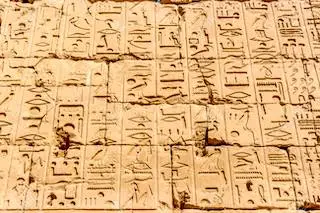‘The writing is on the wall’ is also sometimes expressed as ‘the handwriting is on the wall’ or as ‘mene mene’. The first of those variations is an obvious synonym but what does ‘mene mene’ mean? This is a shortening of ‘mene mene tekel upharsin’, which is of Aramaic origin. If your Aramaic isn’t that strong you can get some guidance from the Bible, Daniel 5, in the story of Belshazzar’s feast. To cut a long Old Testament story short, Belshazzar was indulging in a drunken revelry and debasing sacred temple vessels by using them as wine goblets when a disembodied hand wrote ‘mene mene tekel upharsin’ on the palace wall.
On the face of it, and using a literal translation, this appeared meaningless. The expression seemed to mean ‘two minas, a shekel and two parts’ or alternatively ‘numbered, weighed, divided’. None of this meant much to Belshazzar, who decided that he needed further interpretation and sent for the Jewish exile Daniel. It then became clear that the phrase was an elaborate wordplay, relying on the fact that each word can denote a different coin, and the third word can be interpreted as ‘Persia’. Daniel’s interpretation, as recorded in the first easily understood English version of the Bible, the King James Version, 1611, was:
And this the writing that was written, MENE, MENE, TEKEL, UPHARSIN.
This the interpretation of the thing:
MENE; God hath numbered thy kingdom, and finished it.
TEKEL; Thou art weighed in the balances, and art found wanting.
PERES; Thy kingdom is divided, and given to the Medes and Persians.
The point of the moral tale was that Belshazzar couldn’t see the warning that was apparent to others because he was engrossed with his sinning ways.
The subtlety of the biblical wordplay is now somewhat lost on those of us who don’t speak ancient Aramaic. Perhaps a flavour of the style can be conveyed by comparing it to the lyrics of the popular World War II novelty song Mairzy Doats:
Mairzy doats and dozy doats and liddle lamzy diveya
A kiddley divey too, wooden shoe?
Literally, that’s meaningless but a wartime Daniel could have translated it into its actual meaning:
Mares eat oats and does eat oats and little lambs eat ivy,
A kid’ll eat ivy too, wouldn’t you?
‘Writing on the wall’ began to be used figuratively, that is providing warnings where no actual writing or walls are involved, from the early 18th century; for example, Jonathan Swift’s
Miscellaneous works, 1720:
A baited Banker thus desponds,
From his own Hand foresees his Fall;
They have his Soul who have his Bonds;
‘Tis like the Writing on the Wall.

